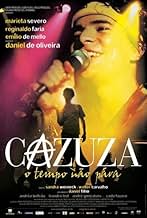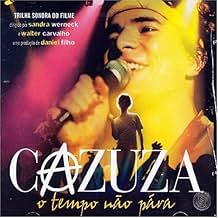Cazuza: O Tempo Não Pára
- 2004
- 1h 38min
CALIFICACIÓN DE IMDb
6.9/10
4.6 k
TU CALIFICACIÓN
Agrega una trama en tu idiomaThe life and times of Cazuza, Brazilian singer/poet/enfant terrible, from his start with rock group "Barão Vermelho", to his death from Aids, in 1990, showing his career, love affairs, and i... Leer todoThe life and times of Cazuza, Brazilian singer/poet/enfant terrible, from his start with rock group "Barão Vermelho", to his death from Aids, in 1990, showing his career, love affairs, and involvement with drugs.The life and times of Cazuza, Brazilian singer/poet/enfant terrible, from his start with rock group "Barão Vermelho", to his death from Aids, in 1990, showing his career, love affairs, and involvement with drugs.
- Dirección
- Guionistas
- Elenco
- Premios
- 23 premios ganados y 18 nominaciones en total
Vitor Hugo
- Bené
- (as Victor Hugo)
- Dirección
- Guionistas
- Todo el elenco y el equipo
- Producción, taquilla y más en IMDbPro
Opiniones destacadas
How can we know if this was a superficial picture of Cazuza? Could we ever separate the man from the myth? The movie did show him as being a spoiled kid, self destructive and with no boundaries and at the same time, his passion and ability to make poetry out of anything - politics, love, relationships and even his imminent encounter with death. For whoever expected the movie to be a political statement, I understand the disappointment. The movie focused on his legacy (probably what he'd proud of the most): his music. Excellent work from main actor Daniel de Oliveira impersonating Cazuza - especially towards the end, it was amazing, very touching. I liked the way it ended, not falling for an easy soap opera melodrama.
I'd recommend it - great movie.
I'd recommend it - great movie.
The impression I had on the first hour of the movie was that it was more like a scrapbook of some memorable events in Cazuza's life rather than a biography. The scenes have no connection, it seems they're only there for you to know what happened. It looks like a story told by a fan who collects news about him. There is no drama, nothing to expect, no plot at all.
The last 30 minutes aren't really a change, but it's a more dense part, because of the discovery of the disease that is slowly killing him.
The only things that save the movie are the performance of Daniel de Oliveira, not only on stage but also off, and of course the songs and poetry of Cazuza.
The last 30 minutes aren't really a change, but it's a more dense part, because of the discovery of the disease that is slowly killing him.
The only things that save the movie are the performance of Daniel de Oliveira, not only on stage but also off, and of course the songs and poetry of Cazuza.
Not being a Cazuza fan, I was remarkably impressed with how good, inspiring, and unforgettable this movie proved to be.
Some may be put off by the narrative style, which employs a significant amount of freedom in its composition. We aren't treated to a normal dramatic progression, instead being given specific segments of time covering Cazuza's adventures, relationships, dreams and hardships, as if we were looking at a picture book. This brings a sense of poetry, liveliness and urgency to the picture, even if it may displease moviegoers used to Hollywood film-making.
The Cinematography - as the narrative style - is urgent, free-floating, using only hand-held cameras. To put it quite simply, the picture perfectly captures the poetry of being young, of hoping for better days, of yearning to feel alive and connect with people.
Daniel de Oliveira's performance is easily one of the best I've seen this decade, and I hope he picks up many awards around the globe with his work - both extremely convincing and captivating. He's one of your great young actors, and I hope to see him in many more pictures.
Thankfully, this is a picture that can be enjoyed by any Brazilian, as it is a testimony of a great period of our culture. This film is not only about Cazuza - is about any kid out there with dreams in his heart and the courage to try and go some good in this world.
Congratulations to Carvalho, Werneck, Lucinha and co. for creating one of the Best Brazilian films in recent memory.
Our idols cannot - and will not - be forgotten.
Some may be put off by the narrative style, which employs a significant amount of freedom in its composition. We aren't treated to a normal dramatic progression, instead being given specific segments of time covering Cazuza's adventures, relationships, dreams and hardships, as if we were looking at a picture book. This brings a sense of poetry, liveliness and urgency to the picture, even if it may displease moviegoers used to Hollywood film-making.
The Cinematography - as the narrative style - is urgent, free-floating, using only hand-held cameras. To put it quite simply, the picture perfectly captures the poetry of being young, of hoping for better days, of yearning to feel alive and connect with people.
Daniel de Oliveira's performance is easily one of the best I've seen this decade, and I hope he picks up many awards around the globe with his work - both extremely convincing and captivating. He's one of your great young actors, and I hope to see him in many more pictures.
Thankfully, this is a picture that can be enjoyed by any Brazilian, as it is a testimony of a great period of our culture. This film is not only about Cazuza - is about any kid out there with dreams in his heart and the courage to try and go some good in this world.
Congratulations to Carvalho, Werneck, Lucinha and co. for creating one of the Best Brazilian films in recent memory.
Our idols cannot - and will not - be forgotten.
This film cannot be seen as a good piece of film as it is. Out of context, it has no special meaning besides the point it constantly tries to make of the clichés we have heard over and over again. That is, gay men taking drugs, having sex with everyone they see and being self-destructive. As it usually happens with Brazilian cinema, this movie doesn't try to break away from the national social basis and only repeats all the beliefs the citizens and foreigners have of the country and its own people. A very sad thing to do, a very bad message to pass. I watched this film remembering my mother telling me how horrible it is when people start smoking joints and end up dying of aids for sharing needles and being promiscuous. That's what everyone goes around saying in Brazil, in sensationalist terms, and this is how this film is presented. It is a true pity that such a good composer and singer had to be pictured in such horrible colours. And worst still that Brazil hasn't learnt how to do something new that will challenge the people to expand their way of thinking into new areas.
***** MAY CONTAIN SPOILERS *******
If you're not Brazil and have never lived here, you probably don't know Cazuza. But Brazilian people and lucky ones who lived in this country in the 1980's know this great composer and singer. In 1981 he begun his career as the singer of Barão Vermelho, that soon became one of the most popular Brazilian rock bands. With great heats playing on TV and radio, Cazuza and his band got fans all over the country. In 1985 he decided he wouldn't keep on playing with his mates and kicked out a solo career, that took five years. Cazuza had more success due to his talent and courage to sing everything he wanted. Unfortunately, he also kept on using drugs and with dangerous free sex habits. As a consequence, he got AIDS. Even after the discovery of this terrible disease, he kept on singing and showing no fear of showing the whole country the effects of AIDS. In 1990 he died. This is the story everybody (in Brazil at least) knows. This is what we saw on TV news, magazines and newspapers. The film shows it all in a beautiful, but at the same time strong, way. Daniel Oliveira plays the protagonist in a great way, and physically he really looks like Cazuza. Marieta Severo and Reginaldo Faria, two of the best Brazilian actors, play Cazuza's parents, who never left him alone. Walter Carvalho and Sandra Werneck direct this movie in a remarkably way. Cameras are never totally stopped. There's always some kind of movement, as if the cameramen had the cameras on their shoulders all the time. This gives a flavour of movement, that makes some kind of tense atmosphere.
My Rate 8/10
If you're not Brazil and have never lived here, you probably don't know Cazuza. But Brazilian people and lucky ones who lived in this country in the 1980's know this great composer and singer. In 1981 he begun his career as the singer of Barão Vermelho, that soon became one of the most popular Brazilian rock bands. With great heats playing on TV and radio, Cazuza and his band got fans all over the country. In 1985 he decided he wouldn't keep on playing with his mates and kicked out a solo career, that took five years. Cazuza had more success due to his talent and courage to sing everything he wanted. Unfortunately, he also kept on using drugs and with dangerous free sex habits. As a consequence, he got AIDS. Even after the discovery of this terrible disease, he kept on singing and showing no fear of showing the whole country the effects of AIDS. In 1990 he died. This is the story everybody (in Brazil at least) knows. This is what we saw on TV news, magazines and newspapers. The film shows it all in a beautiful, but at the same time strong, way. Daniel Oliveira plays the protagonist in a great way, and physically he really looks like Cazuza. Marieta Severo and Reginaldo Faria, two of the best Brazilian actors, play Cazuza's parents, who never left him alone. Walter Carvalho and Sandra Werneck direct this movie in a remarkably way. Cameras are never totally stopped. There's always some kind of movement, as if the cameramen had the cameras on their shoulders all the time. This gives a flavour of movement, that makes some kind of tense atmosphere.
My Rate 8/10
¿Sabías que…?
- TriviaCazuza's manager Zeca passed away in the same date he did, exactly twenty years later.
- ConexionesReferenced in Mussum, Um filme do Cacildis (2019)
- Bandas sonorasCirco Voador
Written by Guto Graça Mello
Selecciones populares
Inicia sesión para calificar y agrega a la lista de videos para obtener recomendaciones personalizadas
Detalles
- Fecha de lanzamiento
- País de origen
- Sitios oficiales
- Idiomas
- También se conoce como
- Cazuza: Time Doesn't Stop
- Productoras
- Ver más créditos de la compañía en IMDbPro
- Tiempo de ejecución
- 1h 38min(98 min)
- Color
- Mezcla de sonido
- Relación de aspecto
- 1.85 : 1
Contribuir a esta página
Sugiere una edición o agrega el contenido que falta


























